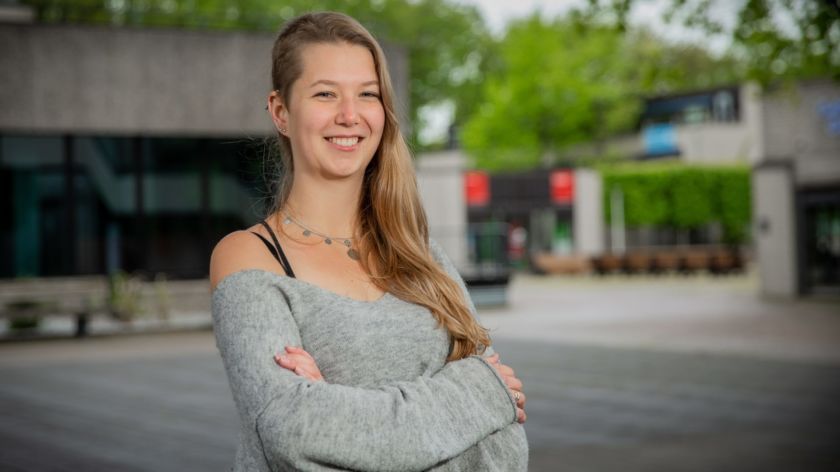Marie-Sophie Simon (asap) from Germany aims to represent all students
-
 Marie-Sophie Simon (asap). Photo: David van Haren
Marie-Sophie Simon (asap). Photo: David van Haren
From May 31st to June 3rd, students can vote for the University Student Council (USR). Vox meets the leaders of both parties to talk about their plans. Today: Marie-Sophie Simon, the first non-Dutch student to lead a student party. She wants to be an example for other internationals.
A first at Radboud University: an international leading a student party. German Marie-Sophie Simon (22) heads the list of asap. ‘I really like it’, she says. ‘It sends a signal that international students are welcome in the participational bodies. I also hope to set an example for other internationals.’
Most meetings of the University Student Council are in Dutch. Are you worried about that?
‘It certainly won’t always be easy, but I think it’s doable. Another foreign member of the USR (Gina Advena, ed.), who participated last year , told me that other members are happy to help and translate. Aside from that, I can read and understand Dutch quite well, so I’m not completely lost when seeing Dutch.’
If you could choose, would English be the main language in the Joint Assembly?
‘If it were up to me, it would. Radboud University advertises itself as an international community, but it’s really hard for international students to participate in the participational bodies because of the language barrier. At the same time the university can profit from the knowledge and experience of internationals. I do realize that there are disadvantages of using English as the main language. For instance some people prefer not to express themselves in another language. So we have to come up with something to accommodate everyone.’
Do you represent all students?
‘For sure. I’m happy to be the voice of international students, because they don’t always have proper representation. But in the end I represent everybody, including Dutch students.’
Last year asap nearly disbanded, but this year you managed to have a full list again. How did that go?
‘As I wasn’t involved last year, I don’t know exactly what happened. So I can say very little about that. I do feel that the atmosphere within the party is excellent and that we have a very strong list. I’m very positive.’
Should voters worry about whether the party will end in the near future?
‘I don’t have any doubts about the continuation of the party. We have come back stronger after discussing our future.’
What topic do you want to focus on next year?
‘As chairman of study association Thalia, I see how students struggle during the corona crisis, and hear stories about stress, fear and uncertainty. So I want to focus on student welfare. It’s extremely frustrating to hear about the long waiting list for the student psychologists. Sometimes students have to wait eight weeks for an intake interview, only to hear they’re at the wrong place. The university really needs to do something about that.’
What do you suggest?
‘We want set up a triage system where students immediately can get an intake interview, so students who need help can get help quickly. I also hope that physical lectures and activities will return as soon as the corona crisis is over. Students really miss the bond with the university.’
At the same time you propose in the election program that students should be able to take exams at home. How does that match?
‘Offering flexibility for me is a good thing because a student can choose what works best for their personal situation. Right now we are forced to work from home. For a lot of students that clearly doesn’t work. They should definitely come back to campus. But other students, who live further away, or have to take care of someone, prefer to stay at home. They should have the opportunity to take exams at home.’
Doesn’t this result in many practical problems for teachers?
‘Certainly, that’s why we want to consult teachers to find a solution which works for both. Lecturers also benefit from our proposal as they want students to be motivated to succeed as well.’
How is campaigning going?
‘Running an online campaign isn’t always easy, but in general it’s going well. We are trying to reach students via social media, for example by posting videos. The livestream where we presented the list of candidates list was watched live by more than 250 people. Sometimes I also receive texts from acquaintances saying they saw me, which is a good sign. It shows we’re reaching people.’



